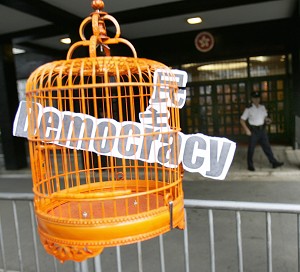
Blair rediscovers civic engagement
The Government is to recruit 100 people to help ministers to shape policies on the public services for the next decade, ministers will announce today. The people, to be selected by market-research organizations as a cross-section representative of the population, will be asked to put themselves in the shoes of the Government’s decision makers and advise on three key areas of policy, including the cultural changes needed to help people improve their life chances. (…) The “public engagement” exercise carries echoes of the Labor Listens campaign conducted by the party more than a decade ago as it drew up its plans for government in 1997. Despite derision from political opponents and the media at the time, ministers insist that it played an important part in stating Labour’s agenda for its first two terms. People will be recruited to take part in a series of regional working groups. In a series of meetings throughout February, they will be presented with the government papers on which ministers are already working in the network of policy reviews begun in October. The participants, who will not be paid but may be able to claim expenses, will be presented with the same dilemmas that ministers face daily and asked to give their views before decisions are made. The Government will structure the consultation so that ordinary people rather than organized lobby groups get the main say. The groups will come together for a Dowing Street meeting in March. They will be advised by a number of junior ministers and senior civil servants at the event. The conclusions will then be presented to the Cabinet in mid-March and will form an integral part of the findings from the public services working group. An aide to Mr Blair said: “Ten years ago the Labor Party listened to the public offered and them a new settlement in British politics: to combine economic efficiency and social justice as complementary partners, not competing opposites. In the past decade Britain has become fairer and more prosperous.This process of public engagement will help provide a crucial routemap to the future.”The big issues: Cultural change – Can the state encourage citizens to change behavior at a time when lives are lost to smoking, alcoholism and obesity? Customer services – How are public-sector services viewed by citizens? – Citizen and state contracts – To consider the extension of “contracts” – such as education maintenance allowances – between government and the citizen within the public sector (source: Times 12/26/2006)

The fact that a government consults a panel of “ordinary citizens” on the key issues arising in the United Kingdom is certainly a good idea in itself, an idea which is consistent with the development of participatory democracy and with the of social capital.
It all depends on the rigor with which this idea is implemented in the choice of the sample, the definition of the questions asked, the group dynamics, the exploitation of the data, and the use made of the responses. Without forgetting that this type of process does not replace other consultation or participation processes such as referendums, polls, or popular juries.
But it is surprising that such consultations only take place every ten years. We can also wonder how Blair would account for the paradox between this type of approach and the British intervention in Iraq. Manipulating public opinion with the help of false intelligence reports to justify a military intervention decided by a foreign government does not seem to fall under participatory consultation?
From there to thinking that this Blairian consultation – decided after ten years in power and without the initial promises of the “Third Way” having really been kept – is a matter of show politics, there is only one step. we would cross quite happily. However, the method has merit, is in tune with the times, and can work if it is applied with caution and sincerity.









|

